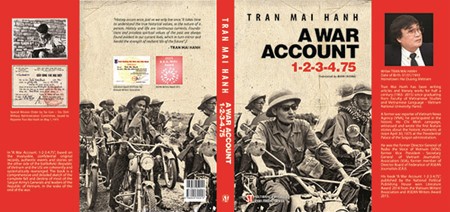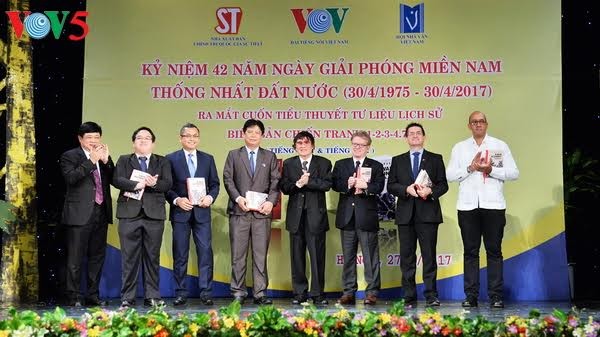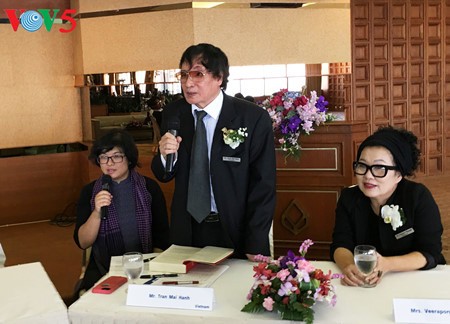(VOVworld) - Historical-documentary novel “A War Account 1-2-3-4.75” by journalist and writer Tran Mai Hanh contains original facts about last days of the Republic of Vietnam administration until the national Reunification Day on April 30, 1975. After three consecutive re-printings, the book now has an English version to help readers worldwide access valuable historical references and a fresh view about Vietnam’s glorious struggle for independence.
 |
| The book’s cover shows reporter Tran Mai Hanh (with glasses) and fellow reporters at the entrance to Saigon in the early morning of April 30, 1975. (Photo: Van Bao/VNA) |
Journalist and writer Tran Mai Hanh‘s novel “A War Account 1-2-3-4.75” was released 39 years after the war ended. In April 1975, he was one of the first war reporters at Independence Palace and filed a report entitled “Ho Chi Minh City glorified by yellow stars” broadcast on Voice of Vietnam on May 1, and printed on Nhan Dan (People) newspaper on May 2. Fully aware of the historical significance of the event, Tran Mai Hanh wrote the book based on original sources he had gained access to during his mission as a Vietnam News Agency envoy during the Ho Chi Minh campaign to liberate the south. He said he decided to write the book because of his duty as a citizen and a journalist given the wealth of information he had:“Life is full of ups and downs and war is not what everyone wants. Peace is the aspiration of humankind. I wrote the book to reveal the ultimate truth without any subjective influence. It’s not true that winner can write whatever he wants and loser can explain whatever he likes. Time will unveil the truth and I decided to reveal the ultimate truth.”
 |
VOV President Nguyen The Ky (1st left) and journalist-writer Tran Mai Hanh (4th right) handed the novel “A War Account 1-2-3-4.75” to foreign ambassadors in Vietnam at the launch of novel in Hanoi on April 27, 2017
|
The journalist and writer said he did not emphasize literary value in the book but upheld the solid value of history. That’s why the book reproduced history as it was with a view from the other side of the battlefield. He was not only a witness of history but guided the audience to an awareness of the war’s truth as it was without prejudices:“The ultimate collapse of the other side praises the nation’s victory and the Party’s leadership. My book does not have a single word about the liberation army nor the Communist Party of Vietnam’s leadership in the war. Although, it tells us why we won, how the people sacrificed, how brave our army was and how talented the Party leadership was.”
Throughout the 19 chapters of the book, the author paints a picture of meetings and battles as well as the thoughts of the Republic of Vietnam’s generals. In the last moments of the regime, there were secret meetings and generals’ contemplation of continuing to fight or surrendering. Vice Chairman of Vietnam Writers’ Association, Nguyen Quang Thieu said:“The book reflects a careful processing of references, especially on the fates, mindsets, and beliefs of war participants from both sides. Humanism takes root deeply in the book, explaining a nation that never surrenders nor lets her country divided. Peace was an overwhelming aspiration following war.”
“A War Account 1-2-3-4.75” was first published by the Truth - National Political Publishing House in April 2014 and has been continuously reprinted and supplemented.
 |
| Hanh talked to Thai readers at the Southeast Asian Writers Awards ceremony |
The book won the 2014 literary award from the Vietnam Writers Association and the 2015 ASEAN literary award by the Thai Royal Court. In a speech delivered at the ASEAN literary forum in 2015, Tran Mai Hai said his book was not to recall the liberation war but to uphold an inspiration of
”more love and trust in life and a joint effort to build final moral values for the future.” The 520 page English version of the book was translated by Manh Chuong and edited by domestic and foreign experts of Metro Writers Translation Company. Nguyen Kim Nga represents the International Books Editing Center of the Truth-National Political Publishing House:“The book has significant historical and literature value. Our effort to translate the book into English is to promote it to the world for a better understanding of the historical gravity of the Vietnamese people’s great victory in the southern liberation and national unification.”